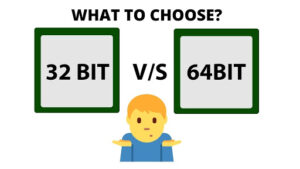
What is 32 bit vs 64 bit
32 Bit vs 64 Bit
Sometimes when installing software we have to choose whether we want to install the 32-bit version of that software or we want to install the 64-bit version. And at that time those of us who don’t know about this, get into a lot of trouble. So today we will know what exactly are these 32-bit and 64-bit versions. And how important is this 32 Bit vs 64 Bit?
In today’s digital landscape, computer processors come in different architectures, including 32-bit and 64-bit. These architectures define how a processor handles data and addresses memory. Understanding the differences between 32-bit and 64-bit is crucial, as it directly impacts system performance, software compatibility, and overall user experience.
Introduction of 32 bit vs 64 bit
When it comes to computer processors, the terms “32-bit” and “64-bit” refer to the type and length of the registers, which are small units of memory within the processor. These registers store data temporarily during processing. The number of bits in the registers determines the processor’s data-handling capabilities.
32 bit vs 64-bit Definition and Basics
In simple terms, a 32-bit processor can handle 32 bits of data at a time, whereas a 64-bit processor can handle 64 bits of data at a time. This fundamental difference affects several aspects of computing, including the maximum amount of memory a system can support and the size of data the processor can process efficiently.
If we talk about the first 32-bit microprocessor, it was made in 1980 at the Bell Laboratory of the AT&T Company and it came on the market in 1982, exactly two years later. And this 32-bit microprocessor takes another three years to use on a computer. Then in 2003, AMD Company made their first 64-bit processor. After that, these 32-bit and 64-bit processors gradually moved to mobile phones.
There are TWO things to keep in mind when it comes to 32-bit and 64-bit processors.
1) Ability to hold numbers: – We know that the job of a computer or phone processor is to do various calculations. And a lot of numbers are needed to do this calculation. The processor of a 32-bit processor can store 2^32 numbers at a time i.e. about 4,294,96,296. On the other hand, a 64-bit processor can store 2^64(2^64-1) numbers at a time, i.e. about 1.844674407×10^19.
2) Memory or RAM Allocation: – A 32-bit processor supports only 4 GB RAM; however, a 64-bit processor supports up to 16.4 Exabytes of RAM.
These two main differences are between 32 bits and 64 bits. The working speed of the processor does not depend on this bit. It totally depends on the architecture of the processor. However, to take full advantage of a 64-bit processor, we need a 64-bit processor with a 64-bit operating system, as well as any software we are using on the computer. If any one of these three is 32-bit, we will not be able to take proper advantage of the 64-bit processor.
Hope everybody understands the difference between these 32-bit and 64-bit processors.
Advantages of 64-bit
-
Increased Memory Capacity: One of the significant advantages of 64-bit processors is their ability to address a much larger amount of memory. While 32-bit systems are limited to 4 GB of RAM, 64-bit systems can support significantly more, often ranging from 8 GB to several terabytes. This expanded memory capacity is particularly beneficial for resource-intensive tasks like video editing, 3D modelling, and running multiple virtual machines.
-
Enhanced Performance: 64-bit processors can handle larger chunks of data, resulting in improved performance for certain applications. Tasks that require heavy data processing, such as scientific simulations and data analysis, can see substantial performance gains when executed on a 64-bit system.
-
Better Security: 64-bit processors often incorporate advanced security features that are not available in 32-bit counterparts. These security enhancements provide improved protection against common exploits and vulnerabilities, making 64-bit systems more resistant to attacks.
Advantages of 32-bit
-
Compatibility: One of the main advantages of 32-bit systems is their extensive compatibility with older software and hardware. Many legacy applications and peripherals were designed for 32-bit environments, and they may not work seamlessly on 64-bit systems. If you rely on older software or devices that lack 64-bit support, sticking with a 32-bit system might be necessary.
-
Wider Software Availability: While the trend is shifting towards 64-bit software, there are still some applications that are exclusively developed for 32-bit systems. If you heavily depend on specific software that is only available in 32-bit versions, opting for a 32-bit system might be more suitable.
Limitations of 64-bit
-
Compatibility Concerns: As mentioned earlier, some older software and hardware may not work properly on a 64-bit system. This incompatibility can be a significant drawback, especially if you rely on specific tools or peripherals that have no 64-bit support.
-
Increased Memory Usage: Due to its expanded memory capacity, 64-bit software tends to consume more memory compared to its 32-bit counterpart. While this may not be a significant concern for modern systems with ample memory, it can be a limiting factor for older computers with limited RAM.
Limitations of 32-bit
-
Memory Limitation: The most significant limitation of 32-bit systems is their restricted memory-addressing capability. As mentioned earlier, these systems can support a maximum of 4 GB of RAM. If you require more memory for resource-intensive tasks, a 32-bit system might not be sufficient.
-
Performance Constraints: 32-bit processors can handle a smaller amount of data at a time compared to 64-bit processors. This limitation can result in decreased performance when executing tasks that involve extensive data processing.
Performance Differences between 32 Bit vs 64 Bit
In terms of performance, 64-bit systems generally outperform their 32-bit counterparts in tasks that involve large data sets and require efficient memory utilization. However, for everyday tasks and older software, the performance difference might not be noticeable. It’s important to consider your specific computing needs before deciding on a particular system architecture.
Compatibility Concerns
When transitioning to a 64-bit system, compatibility becomes a critical factor. While most modern software is available in both 32-bit and 64-bit versions, it’s essential to verify the compatibility of any specialized software or hardware you rely on. Additionally, device drivers and peripherals should have 64-bit support to ensure proper functionality.
Choosing the Right Bit Version
Choosing between a 32-bit and 64-bit system depends on various factors, including your specific requirements, software compatibility, and hardware support. If you work with resource-intensive applications, require large memory capacity, and have compatible software and hardware, a 64-bit system is usually the recommended choice. However, for compatibility with legacy systems or specific software, a 32-bit system might be more appropriate.
Transitioning from 32-bit to 64-bit
If you decide to upgrade from a 32-bit to a 64-bit system, it’s crucial to plan the transition carefully. Back up your data, ensure software compatibility, and verify that all necessary drivers are available for the 64-bit version. Once everything is in order, you can proceed with a clean installation of the 64-bit operating system and migrate your data and software accordingly.
32 bit vs 64-bit Industry Trends
The industry has been gradually moving towards 64-bit architecture due to its increased memory capacity and performance advantages. As software developers optimize their applications for 64-bit systems, the availability of 32-bit software might decrease over time. It’s important to stay up to date with industry trends and evaluate the impact on your specific computing needs.
Security Considerations
64-bit systems often incorporate advanced security features, such as hardware-based DEP (Data Execution Prevention) and ASLR (Address Space Layout Randomization), providing enhanced protection against various types of attacks. If security is a top priority for your computing environment, opting for a 64-bit system can be advantageous.
Conclusion of 32 bit vs 64 bit
Choosing between a 32-bit and 64-bit system depends on several factors, including your specific computing needs, software compatibility, and hardware requirements. While 64-bit systems offer increased memory capacity, better performance, and advanced security features, 32-bit systems are still relevant for compatibility with legacy software and hardware. It’s crucial to assess your requirements and make an informed decision when selecting the appropriate bit version for your system.
32 bit vs 64 bit FAQs
FAQ 1: What is the main difference between 32-bit and 64-bit?
The main difference lies in the amount of data a processor can handle at a time. A 32-bit processor can handle 32 bits of data, while a 64-bit processor can handle 64 bits of data.
FAQ 2: Can I run 64-bit software on a 32-bit system?
No, 64-bit software is designed specifically for 64-bit systems and cannot be run on a 32-bit system.
FAQ 3: How do I check if my computer is running on a 32-bit or 64-bit version?
On Windows systems, you can go to “Settings” > “System” > “About” to check your system type. On macOS, click the Apple menu, select “About This Mac,” and look for the “Processor” information.
FAQ 4: Why are 64-bit processors becoming more popular?
64-bit processors offer increased memory capacity, improved performance for certain tasks, and advanced security features. As software and hardware evolve, 64-bit systems are better equipped to handle modern computing needs.
FAQ 5: Should I upgrade from 32-bit to 64-bit?
The decision to upgrade depends on your specific requirements and compatibility with software and hardware. If you need increased memory capacity and better performance, and your software and hardware are compatible, upgrading to 64-bit can be beneficial.
|
Read More |
|
|





I guess I am the only one who came here to share my very own experience. Guess what!? I am using my laptop for almost the past 2 years, but I had no idea of solving some basic issues. I do not know how to Download Cracked Pro Softwares But thankfully, I recently visited a website named cracksnew.org
Ummy Video Downloader Crack
I like your all post. You have done really good work. Thank you for the information you provide, it helped me a lot. I hope to have many more entries or so from you.
Very interesting blog.
iBackupBot Crack
GridinSoft Trojan Killer Crack
EagleFiler Crack
I like your all post. You have done really good work. Thank you for the information you provide, it helped me a lot. I hope to have many more entries or so from you.
Very interesting blog.
AVS Image Converter Crack
EagleFiler Crack
I like your all post. You have done really good work. Thank you for the information you provide, it helped me a lot. I hope to have many more entries or so from you.
Very interesting blog.
EagleFiler Crack